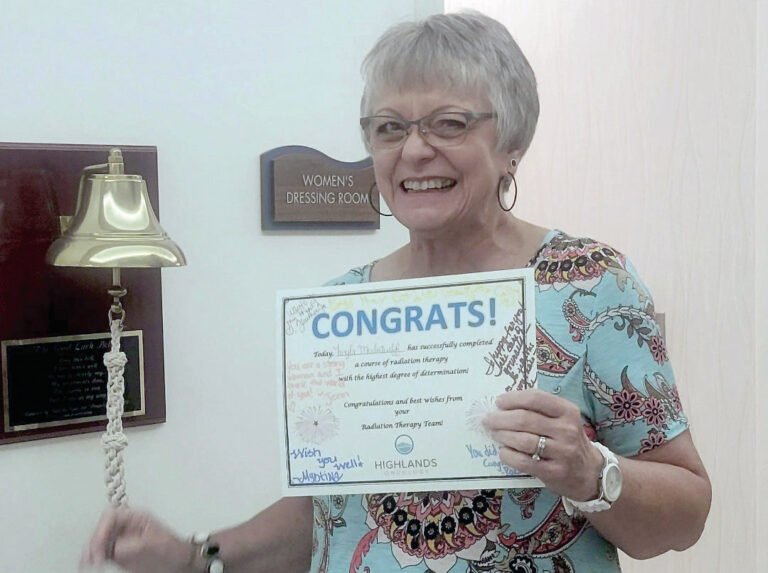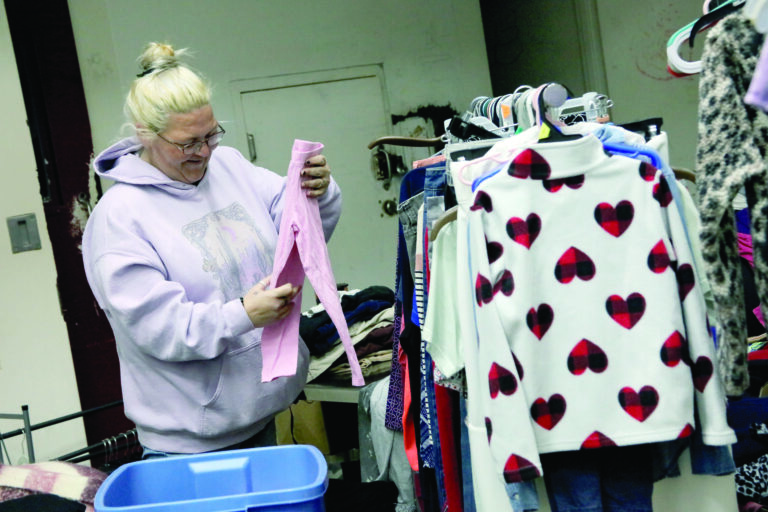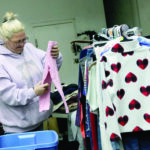Navigating the CARE-ousel

McInturff: ‘How many women have lost their lives because they aren’t being taken care of?’
Twyla McInturff, former Librarian for the Wheaton School District, is fighting her second battle with breast cancer.
Her first diagnosis was in 2010, and her second should have been diagnosed far faster than it was. McInturff is prepared to fight breast cancer, however, she did not think she would have to fight her doctors nearly every step of the way.
She aims to help people understand they must be an advocate for themselves – even when it feels impossible.
McInturff noticed about four years before her first breast cancer diagnosis in 2010, that she had reoccurring knots in her breast.
“I had been getting ultrasounds and mammograms,” she said. “The technician said, ‘The minute you find something – call me.’ So, I called him, and I went in.”
After the scans, the doctor was on the phone, and he didn’t want to let McInturff in before he got the results.
“He just stood there and kept saying, ‘You’re sure? Did you double check?’ and so on,” McInturff said. “He turned to me and said, ‘I’d have bet money that the knot was cancer, but they said it isn’t.’” McInturff said she did end up changing doctors and when she went in her new one, she was told everything looked fine and to return McInturff in a year.
“I told her I had been seen every six months due to my background,” she said. “She told me they were treating me, not my mother or my grandmother.
“I decided that I didn’t need to agree with everything she said, or even like her and continued to see her. But in 2010 I pushed harder about the knots.”
McInturff said she was never examined, but the doctor kept asking, “You can feel it?’
“She just kept asking me over and over again,” she said. “Yes — I can feel it. She told me they would see me in six months. But they did do a biopsy, and it came back as cancer.”
It was exactly in the same area the first doctor thought there was cancer.
“I went to a surgeon who I liked,” McInturff said. “But I was going to have to work with the same doctor who wouldn’t even examine me, so I said I wanted to go somewhere else. I went to Arkansas, where they had some excellent doctors. But I ended up back in Joplin.”
McInturff went through a mastectomy and reconstructive surgery, as well as long term medications.
“In 2018, I went back to the doctor noting a lump I was feeling,” she said. “I was sent for an MRI and ultrasound. But they weren’t concerned.
“Every year I complained about the lump, went for tests and he said, ‘It’s just scar tissue.’” After a few years, McInturff said she was experiencing chest pains, body aches and severe insomnia, as well as undergoing multiple surgeries.
“I complained and he said it was the medication,” she said. “On July 1, 2020, I completed my 10 years of medication. So, I went back and told him it is growing, and it is changing.
“I got the same response I’d been getting for the past few years, ‘No, there is nothing there.’” In the fall of 2023, McInturff said things really began to change.
“By Christmas, it was insane,” she said. “I found a guy in Arkansas that explained everything to me, and he did an ultrasound, but he agreed it was nothing.
“I kept saying it was getting worse. By January 2024, I had another ultrasound, and although he said it was fine, he told me they would take it out. I said, ‘Finally.’” McInturff said there were scheduling issues and other issues with the office in Arkansas, so she ended up back in Joplin.
“He told me to come in and he would refer me somewhere else,” she said. “I had another ultrasound, and he said I had an infection.
“I said, ‘For five years?’ I think that made him mad.”
McInturff changed doctors once again, but this time to one she had seen before and liked.
“He will just tell you exactly how it is,” she said. “He examined me for maybe a minute and said, ‘Twyla, I think your cancer is back.’ It was infuriating. Thinking about all the doctors that I had seen who either didn’t know what they were doing, or they just didn’t care.”
McInturff underwent another mastectomy, and had her implants removed, but decided against reconstructive surgery for the second time because of the radiation.
“After all of that, I went back to the original doctor,” she said. “He told me that if they had done what they should have done five years ago, I wouldn’t have cancer now.
“I said, ‘I have seen you every year for five years. You never examined me. You told me to let the doctors do their jobs. You said it was nothing – just scar tissue.’” McInturff said she had to see him every week or two after that, and he would tell her the same thing, that if it was taken care of five years ago, she would have cancer now.
“I gave him the same response every time.” She said. “They did tell me that no lymph nodes were involved but they didn’t have clear margins, so I’d have to do radiation.
“They gave me an ONCON test and said they would call me back with the results.”
The Oncotype DX Breast Cancer Recurrence test provides a numerical score from 0 to 100, which represents the risk of breast cancer recurrence.
“After two weeks I called and asked about my score,” McInturff said. “They said they couldn’t give me the score that I would have to wait for my next appointment. I was furious. And I sent a note in the patient portal expressing that.”
Her next appointment happened to be just a few days later.
“I go in and he tells me the score came back as a surprise, and it was high, so I would have to do Chemotherapy,” she said. “He had already told me I wouldn’t have to do chemo, so that answer just made me madder.
“I am chemically sensitive and asked about other options. I said I want a second opinion.”
McInturff eventually made her way to The University of Kansas Cancer Center Breast Surgery Center.
“I made an appointment, and the doctor was prepared for it,” she said. “I liked that. He told me about another option that just recently had been approved for early-stage treatment.”
She was made aware of the list of side effects.
“I knew some women who didn’t have any issue with the side effects of this medication.” she said. “But I know there are women who absolutely can’t do it.”
McInturff went straight to radiation after that appointment.
“I had done some research and found that KU had a machine that is less damaging to internal organs,” she said. “But, it wasn’t feasible to keep going to KU, so that doctor suggested I go back to Arkansas, and that he would work with them on my care.
“I went to Arkansas and immediately said I wanted a new oncologist.”
McInturff told her story to front desk receptionist, who she said was livid by the end.
“She went to get one of her higher ups to come talk to me,” she said. “I told my story again. I told her, ‘I wont walk into his office again.’
“She said I absolutely would not have to — no one deserves to be treated the way I had been.”
McInturff and the front desk staff went through a few options until they finally landed on a doctor.
“From what they were saying, it seemed like she had only recently come back to work after some time off,” McInturff said. “She was a young lady, maybe in her 40s, she had younger children, and she had just finished her breast cancer treatments.
“She was also on the same medication that I was looking at starting.”
In all honestly, McInturff told this new doctor that she feels she has lost faith in doctors.
“For 13 years, I told these doctors about my symptoms,” she said. “They looked at me like I was nothing but a whiny woman. So, I told her I might have some difficulty explaining things to her.
“She said, ‘We will work through that.’ She listened, and she had answers. She has just been amazing.”
McInturff and her new doctor worked together through the medications and the concerns.
“At some point through the years, I had been concerned with lymphedema,” she said. “I had expressed those concerns which were of course waved over. Eventually I learned they had a lymphedema department. I asked him, ‘Do you think we should try that?’” Now, McInturff has been seeing that same doctor, her new oncologist, and lymphedema therapist, a lymphedema massage therapist, a supportive care doctor, a hand therapist and surgeon, a foot doctor, and a physical therapist.
“You have to be an advocate for yourself,” she said. “I regret where I started. At that first appointment with an oncologist, I should have listened to myself.
“You have to say, ‘No. I want this, not that. What if we tried this?’ If you don’t stand up for yourself, you’ll be six feet under.”
McInturff implores people to pay attention to their gut instincts.
“What I would like to say now to all of those doctors who failed me is, ‘This is what you have done to my life.’” She said. “I am 71. I will be fighting this the rest of my life.
“How many women have lost their lives because they aren’t being taken care of?”
While the support from medical professionals has been lacking for most of her breast cancer treatment, McInturff said there have been people in her life who stood with her.
“I’ve had so much support from my husband, my children, my church and even from other congregations,” she said. “That is something that has been significantly better especially this second round.
“I can’t imagine the difficulty for the women who don’t have that support and have to go through this.”
When Janice McCracken, founder of the Power of Pink, first came to McInturff in 2010, the organization had just started.
“She asked me and one other woman to be the first recipients,” she said. “At first, I said I didn’t know if I wanted to, I didn’t know if I wanted to be so public.
“But I thought, if I can get one woman to do a self-exam, how could I not get out there and work with this organization.”
McInturff said she has had many women thank her for her openness.
“Some of these women have questions and don’t have anyone to ask or didn’t know how to ask,” she said. “That was my purpose. Helping these women do self-exams and get tested – you need to do it. Be an advocate for yourself, and for the women around you.”
McInturff spends a lot of her time listening to stories of other people and finding them on social media.
“For someone to really pay attention or to ask how you are doing, people don’t know how much that means,” she said. “There is a fine line you have to learn to toe with this diagnosis. You have to keep going, and to keep moving forward. But, going just past that line can really take you back, and it takes a lot to come back from that.”
McInturff said some of the worst things she has been told comes from a place of ignorance and not knowing what to say.
“There is just a lack of knowledge of the general population about cancer treatments,” she said. “I have had people tell me that since I didn’t do chemo/ radiation the first time I was diagnosed, I didn’t have the right to say I had cancer.
“At the time, I was struggling mightily on Arimidex.”
McInturff said she tries to stay positive and not complain.
“My usual answer is, ‘I’m ok, thank you,’” she said. “But I seriously feel like I am lying through my teeth. But I worry that if I’m honest I’ll just be a whiny woman.
“I’ve kind of decided that my answer is going to be, ‘I’m still struggling with the side effects of the medicine, but I am making it. Thanks for asking.’” McInturff said she is truly blessed to have the
Kyle
friends she can be totally honest with.
“Cancer patients and probably anyone with health issues should be careful,” she said. “We need to keep a good attitude, but that doesn’t mean we have to always be Miss Suzy Sunshine.
“I see women on some of the support sites who get offended by everything, even the color pink. But we have to understand that other people have no idea about the struggles some of us go through, but for the most part they are trying to be encouraging and well meaning.”
McInturff said that by the grace of God she is still here, still standing.
“Not everyone can say that,” she said. “[Not even] my mom and my sister.”



